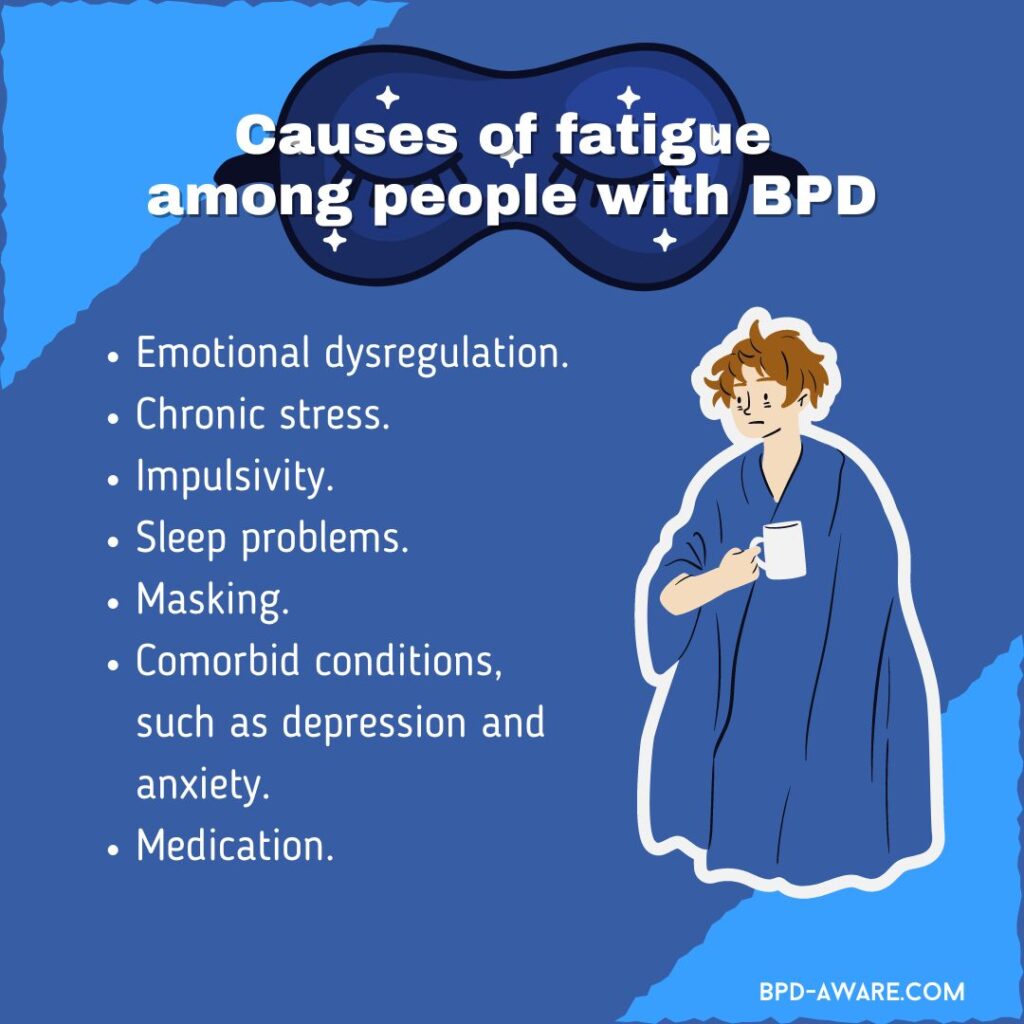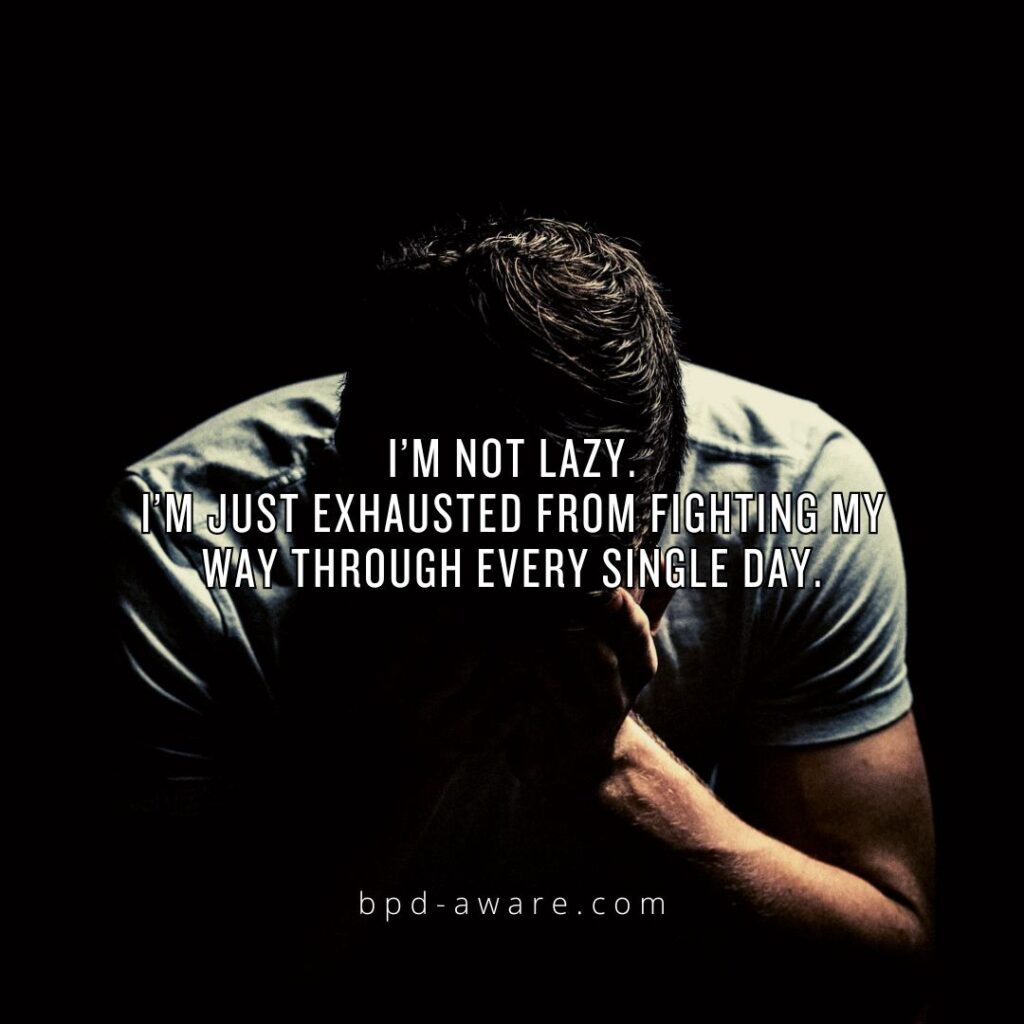While it’s not a core feature of Borderline Personality Disorder (BPD), it’s incredibly common for people with BPD to suffer from fatigue. It’s one of the most common complaints I hear from my friends who have with BPD. As someone who has recovered from BPD myself, I can certainly relate to this. Fatigue has been something that has dogged me for most of my adult life and cost me several opportunities.
Why do people with BPD feel so tired all the time?
Like so much in life, there is no one true answer. The fatigue experienced by people with BPD is likely caused by a combination of factors. Having a personality disorder like BPD, or any mental health issue, is hugely exhausting.
The rollercoaster of emotions is a key factor. The constant ups and downs and intense emotions are draining. It’s like the emotional part of the mind is running on 200% all of the time. Living this way is not sustainable, and sooner or later you will burn out completely. But that’s only one factor at play.
Chronic stress also causes extreme tiredness and most people with BPD suffer from chronic stress. The BPD brain is often on high alert, in fight-or-flight mode. People with BPD tend to have a hyperactive Hypothalamic-Pituitary-Adrenal Axis, which is the part of the brain that produces cortisol. Cortisol is the neurotransmitter that’s commonly referred to as the “stress hormone”. When the brain produces too much cortisol, it can lead to fatigue, anxiety, and mood swings.
The impulsive nature of BPD can also lead to exhaustion. When you act impulsively, you’re not considering the consequences of your actions. Deciding to stay up until 4 am playing video games might seem fun at the time, but you’re going to pay for it the next day when you feel tired from lack of sleep. Likewise, impulsivity can lead to poor decisions in what you put in your body – whether it’s food, drink, or drugs. A poor diet or drug abuse will sap your body’s ability to rest and recover properly.
As we’ve outlined before, people with Borderline Personality Disorder often suffer from disturbed sleep patterns. They may struggle to fall asleep, wake up multiple times during the night, have low-quality sleep, suffer from nightmares, struggle to get out of bed in the morning, and so on. Humans are supposed to get roughly 7-9 hours of good quality sleep each night to function properly. The exact amount of sleep needed can vary between individuals, but 7-9 hours is the scientifically accepted amount.
Masking mental health conditions like BPD can be incredibly tiring. Masking is when someone represses signs they’re not neurotypical to better fit in with society. While this can have obvious advantages, it does come at a psychological cost. That cost is stress and burnout. Masking can be of great help in a work environment and while socializing, but it’s incredibly tiring to maintain for long periods. You have to analyze your every move and second-guess your instincts. The result is often when you leave the situation you were masking in, you are exhausted.
Certain health conditions that cause tiredness are frequently comorbid with BPD. Depression, anxiety, PTSD, ADHD, and Eating Disorders are all common among people with BPD and each of them can greatly affect energy levels for varying reasons. It’s important to remember that someone with BPD may have one or more of these co-occurring conditions. It can feel like juggling several balls at once, only these are heavy cannonballs, and they’re quickly zapping you of your energy.
Finally, medication could be a cause of why you’re feeling tired all the time. While medication is helpful in reducing the severity of BPD symptoms, fatigue is a common side-effect of many medications.
To sum it up, extreme tiredness in people with BPD is usually caused by one or more of the following:
- Emotional dysregulation.
- Chronic stress.
- Impulsivity.
- Sleep problems.
- Masking.
- Comorbid conditions, such as depression and anxiety.
- Medication.

What can I do so I don’t feel tired all the time?
The first thing you need to do to start regaining your energy is to pinpoint what are the main causes of your fatigue. If, for example, your sleep patterns are poor, you suffer from depression, and you experience chronic stress then you need to tackle these things. Even if you don’t believe you struggle with sleep, make a renewed effort to improve your sleep hygiene. (Side note: We have an article with recommendations on how to improve your sleep when you have BPD).
Often it’s a good idea to go back to basics. Along with improving your sleep, are you getting enough exercise and eating a healthy, balanced diet? Exercising for thirty minutes or more a day, three or four times a week, along with giving your body the nutrients it needs can make a huge difference to your energy levels.
If you believe that the medication you’re on may be a contributing factor to your fatigue, this is something well worth discussing with your healthcare provider. They may recommend changing doses or switching to a different kind of medication to see if that has a more positive effect.
Stress management is also crucial to avoiding chronic tiredness. The world we live in tends to be so fast-paced that many of us forget to take the time to slow down and practice self-care. Some great ways to de-stress at the end of the day include reading, writing, taking a long bath, exercising, meditating, and socializing.
You may also want to consider if you’re pushing yourself too hard in certain areas of your life. Maybe you need to set some boundaries with certain people and learn to say no more often. It can be a hard thing to do, especially when you’re a people pleaser, but ultimately it’s for your own good.
Finally, therapy can help with almost every cause of fatigue in BPD. Emotional dysregulation, chronic stress, impulsivity, sleep problems, masking, and comorbid conditions can all be improved through therapy. There are several therapy options out there for people with BPD, but the most popular ones are Dialectical Behavior Therapy, Schema Therapy, and Mentalization-Based Therapy.

Final Thoughts
Living with BPD is a constant challenge, and one of the hardest things about it is just how tiring it can be. Most of the symptoms can cause fatigue in their own ways, and when you combine this with the fast-paced modern world, and the weight of expectations, it’s a brutal mix.
While all you might want to do is lounge around in bed whenever you get the chance, this isn’t the best way to boost your energy levels. You need to tackle the symptoms at the root, and this is something that’s best done with therapy.
On top of that, basic self-care like getting regular exercise, eating a balanced diet, and regulating your sleep patterns can also provide a boost.
Feeling tired all the time is a millstone around your neck, dragging you down. You owe it to yourself to do everything you can to boost your energy levels and lighten the load.
Sources, Resource, and Further Reading
- Burnout, Depression, and Borderline Personality: A 1,163-Participant Study: https://www.frontiersin.org/journals/psychology/articles/10.3389/fpsyg.2017.02336/full
- Unveiling the Connection: Emotional Exhaustion and Borderline Personality Disorder: https://www.grouporttherapy.com/blog/borderline-personality-disorder-emotional-exhaustion
- Chronic Sleep Disturbances and Borderline Personality Disorder Symptoms: https://pmc.ncbi.nlm.nih.gov/articles/PMC4129646/
- Why People with Borderline are always Tired: https://www.mentalcurve.com/post/why-people-with-borderline-are-always-tired
















